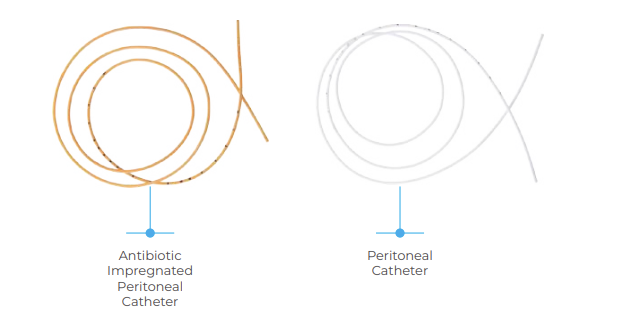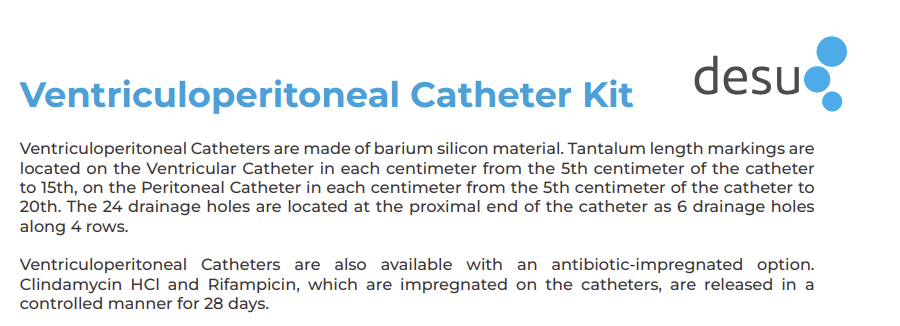Desu Ventriculoperitoneal Catheter Kit
Advanced Catheterization for Safe, Effective CSF Diversion
The Ventriculoperitoneal Catheter Kit by Desu represents the culmination of precision engineering, biocompatible materials, and infection control technology in the field of neurosurgery. Designed for the treatment of hydrocephalus and other conditions requiring the diversion of cerebrospinal fluid (CSF) from the ventricles of the brain to the peritoneal cavity, this all-inclusive kit is a trusted solution among neurosurgeons and medical institutions.

With both standard and antibiotic-impregnated catheter options available, Desu offers flexible choices tailored to clinical needs and infection prevention protocols. The combination of ventricular and peritoneal catheters, along with stylet and right-angled connector, ensures a complete and sterile system that simplifies procedures and improves outcomes.
1. Comprehensive Kit Contents
The Desu Ventriculoperitoneal Catheter Kit includes the following components:
- Ventricular Catheter
- Inner Diameter (ID): 1.3 mm
- Outer Diameter (OD): 2.5 mm
- Length: 23 cm
- Peritoneal Catheter
- Inner Diameter (ID): 1.1 mm
- Outer Diameter (OD): 2.5 mm
- Length: 120 cm
Stylet
Right-Angled Connector
Each component is manufactured to the highest quality standards, ensuring compatibility, ease of use, and long-term reliability.
2. Material and Design
Barium Silicone Construction
Both the ventricular and peritoneal catheters are made from barium-impregnated silicone, which offers two critical benefits:
Radiopacity: Allows for real-time visualization under fluoroscopy or X-ray.
Biocompatibility: Ensures safe long-term implantation within the human body.
This material is soft enough to prevent tissue damage yet durable enough to resist compression, kinking, or tearing during manipulation or post-operative use.
Tantalum Length Markings
Tantalum, a highly radiopaque metal, is used to create centimeter-spaced length markings on the catheter:
Ventricular Catheter: Marked from the 5th to the 15th centimeter
Peritoneal Catheter: Marked from the 5th to the 20th centimeter
These markings assist surgeons with precise placement, reducing guesswork and increasing confidence during critical stages of implantation.
3. Precision Drainage Port Design
Effective CSF drainage depends on the strategic placement and number of perforations. Desu’s ventricular catheters feature 6 drainage holes arranged in 4 rows, while the peritoneal catheter is equipped with 24 drainage holes to allow efficient absorption into the peritoneal cavity.
These ports are located at the proximal ends of each catheter and are engineered for:
Even CSF flow distribution
Reduced risk of clogging
Enhanced drainage volume
The combination of multiple perforations and optimal spacing reduces the risk of obstruction and improves long-term functionality.
4. Infection Control: Antibiotic-Impregnated Catheter Option
One of the most innovative features of the Desu Ventriculoperitoneal Catheter Kit is the availability of antibiotic-impregnated catheter components. Both the ventricular and peritoneal catheters can be supplied with a controlled-release formulation containing:
Clindamycin Hydrochloride
Rifampicin
These antibiotics are embedded into the catheter material and provide controlled prophylactic protection for up to 28 days after implantation—exactly during the period when patients are most vulnerable to post-surgical infection.
Benefits of Antibiotic Impregnation:
Prevents colonization by common pathogens (e.g., Staphylococcus aureus, Staphylococcus epidermidis)
Reduces the need for systemic antibiotic prophylaxis
Minimizes the risk of shunt-related infections and revision surgeries
Ensures high local concentration without systemic toxicity
This feature is especially useful in pediatric cases and for patients with a history of shunt infections.
5. Right-Angled Connector
The kit includes a right-angled connector that allows secure connection between the ventricular and peritoneal catheters. The design supports:
Atraumatic bending angles
Prevention of kinking or compression
Smooth fluid transition between components
Manufactured from clear, medical-grade polymer, the connector is easy to visualize and manipulate during surgery. It also maintains its shape under pressure and is compatible with standard sterilization techniques.
6. Stylet for Controlled Insertion
A stylet is included to facilitate smooth catheter insertion. It offers:
Controlled rigidity during ventricular catheter placement
Reduced risk of trauma to brain tissue
Improved directional control
Once the catheter is in position, the stylet can be easily removed, leaving the flexible catheter securely in place.
7. Dual Catheter System for Total Shunting
The synergy between the ventricular and peritoneal catheter ensures full functionality of the shunt system:
The ventricular catheter collects CSF from the lateral ventricles.
The peritoneal catheter diverts the fluid into the peritoneal cavity, where it is absorbed naturally by the body.
This dual-catheter system allows safe, long-term CSF diversion, helping to relieve intracranial pressure, reduce ventricular dilation, and prevent further neurological damage in patients with hydrocephalus and other CSF-related conditions.
8. Reference Codes and Ordering
Desu provides clear product identification and ordering through the following reference codes:
Reference Code | Product Description |
SVPCK | Standard Ventriculoperitoneal Catheter Kit |
ASVPCK | Antibiotic-Impregnated Ventriculoperitoneal Kit |
This streamlined coding system makes it easy for purchasing teams and hospital supply managers to identify and restock the correct kits.
9. Sterilization and Packaging
All Desu Ventriculoperitoneal Catheter Kits are:
Sterile-packed and ready for immediate surgical use
Individually packaged to maintain sterility and prevent cross-contamination
Sterilized using EO (ethylene oxide), a standard method that ensures both material integrity and pathogen eradication
The packaging is designed for convenience, clarity, and speed in surgical environments.
10. Clinical Applications
Desu’s Ventriculoperitoneal Catheter Kit is indicated for:
Hydrocephalus (congenital or acquired)
Post-hemorrhagic hydrocephalus
Tumor-associated hydrocephalus
Normal pressure hydrocephalus (NPH)
Intracranial pressure (ICP) management
CSF overproduction or obstruction
The kit is suitable for both adult and pediatric patients and compatible with most commercial shunt valves and systems.

